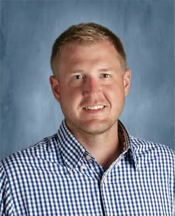Jordan Fast
High School Government and History
Sioux Valley School District

Jordan Fast teaches high school government and history at Sioux Valley School District. He has been teaching for 13 years.
What made you decide to become a teacher?
I had heavy influence through my mother. She was a teacher for many years, and she homeschooled me for a period of my life. She was also an education professor. She’s semiretired now, but she was so skilled and talented. She was always taking us to local historical sites. We were involved in the community, we were always learning.
Why is it important for students to understand history/government?
Learning history is about critical thinking – it helps students to think about the world around them and who they are. They use history to make connections: who they are, who we are, what this country is, and why it matters. It’s about helping them think about the kinds of citizens they want to be. When it comes down to it, it’s about knowing that what we do every day matters.
For example, yesterday, we had a Vietnam veteran come in to talk to the class. He told his experiences of serving in the war, Agent Orange, coming back from the war – all of these things that he personally experienced and the way it affected him and those around him. Having members of the community who were a part of history helped students connect to the content.
What’s the best part of teaching?
I get to be myself every day. I get to engage with people who have a passion for learning. You can find things that excite them. We have high functioning, motivated students here at Sioux Valley. Students really do try hard here. They are very motivated. We’re always talking about the why. I’m also a coach, and I try to incorporate that – that why is a big motivator. When we talk about football, we’re always talking about the why – why do they need to know this, how this affects them, and what they can do with this information. It’s the same in the classroom, and being able to help them connect themselves or their families to history is so rewarding.
What’s the most challenging part of teaching?
It’s tough to be a rockstar every single hour. As I’m getting older, staying relevant to what interests students and what matters in students’ lives has to become more intentional. I have to pay attention to that. If I lose focus of that, then I lose what motivates them. Being connected to what connects them is really important.
As I work to stay aware of that, I find that I learn as much as they learn – there’s always something new that they introduce to me. They’re masters of their content, but their content isn’t written down in our world.
What sort of changes do you foresee in education – what do you think teaching will be like in 15 years?
I think it’s becoming much more technical – I don’t think we’re going to get less high-tech in the future. But as we do that, I think the human factor is going to matter more. I really embrace the human factor, whether it’s questioning theories or going over historical facts, or debating causes and effects. I personally take a lot of time to get to know my students because I think that’s the key.
Tech can be a tool, but there still needs to be an element of face-to-face and connection with other people. Let’s embrace the best methods. We’re in the human business. We’re dealing with people. We’re trying to create great, educated humans, and that has to be done at least in part with face-to-face communication
What is your favorite class project you do with your class?
Geography at the dome. Basically, my class looks at teams, and we predict state football winners based on geographic trends in South Dakota. We have a very high success rate -- it’s between 60 and 70 percent. We’re picking factors such as distance to major cities, DOE Report Card scores, community growth, community income, and more. We factor all of those into a pool. We predict who will win a football game based on that. We do it for fun, to engage in statistical matters.
It's something we have had attention from the media about, and it’s my favorite personally. Sometimes if I go to a football clinic or a social studies get together, I’m the football geography guy. The kids do all the picks, and then we look at the outcomes to see how close we were able to come.
What’s the most useful advice you can give to a new teacher who’s just starting out?
I’ve had two student teachers. I encourage these people to have a lot of fun in the classroom. Having fun is making it personal, making the connections, and being yourself. Students embrace authenticity. I think it’s important to let them see who you are
I like going to work. I like showing up, working with great people, and knowing that I can make it matter.
What’s one thing about teaching that non-teachers don’t know?
I always encourage people to come in and sub, to learn the experience. I wish people could understand how hard these students do work. If students know the why, the importance of this, then they want to do well. They’re motivated. They do care. I want society to know that. They put a lot of effort in the things they do.
The people who work at your school, if you don’t know them, one thing they should know is that there’s a lot of good people who teach and support students at your local school.
